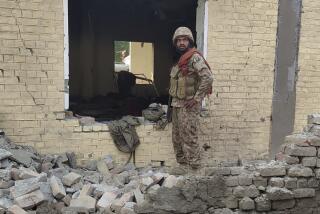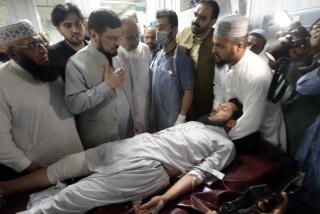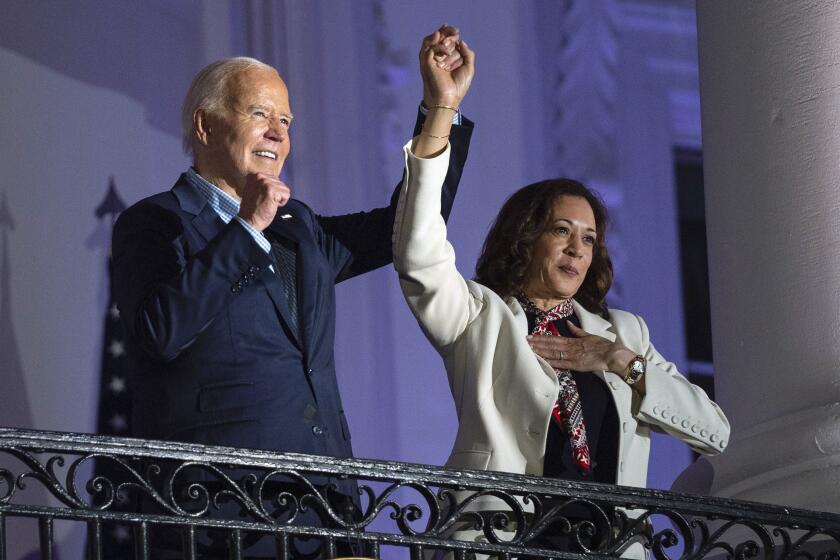Afghanistan mayor killed by suicide bomber
In Afghanistan these days, choosing a life of public service is becoming akin to signing one’s own death warrant.
The mayor of Kandahar, a 65-year-old U.S. citizen who had returned to his native country after the fall of the Taliban to take up his dangerous post, was killed Wednesday by a suicide attacker with a bomb tucked into his turban.
Mayor Ghulam Haider Hamidi was the latest in a long line of senior government and security officials to die a violent death, apparently at the hands of insurgents. The Taliban claimed responsibility for the attack.
The extraordinary campaign of killings has been particularly intense around Kandahar, which is considered pivotal to U.S.-led military efforts to pacify the south of Afghanistan. The Taliban movement regards the city as its spiritual home, and has responded to the North Atlantic Treaty Organization’s military successes in surrounding districts by marking prominent figures and civil servants for death.
Afghan President Hamid Karzai’s younger half brother, Ahmed Wali Karzai, the south’s main power broker, was assassinated July 12 at his heavily guarded Kandahar compound by a trusted family associate. The provincial police chief was killed by a suicide bomber in April. Two deputy mayors were slain last year, one shot as he prayed in a neighborhood mosque.
In addition to such high-profile deaths, dozens of other Kandahari figures such as tribal elders, community leaders and aid workers have been singled out for killing on the grounds that they cooperated with the central government and, directly or indirectly, the Western military.
Tribal rivalries and local intrigue sometimes play a role in such assassinations, however. Hamidi was an ally of Ahmed Wali Karzai, whose death has galvanized a struggle in Kandahar for political power and the extremely lucrative business interests he controlled.
The mayor had also angered some local powers with a road project in the north of the city, and his assailant managed to slip into a crowd of constituents upset about the accidental deaths of two people killed this week by a bulldozer working on the construction.
A chilling Taliban claim of responsibility made reference to Hamidi having been systematically stalked, with his killer waiting patiently for a breach in the intense security that surrounds all government officials. “He was at the top of the list of those to be assassinated,” said Taliban spokesman Qari Yousef Ahmadi, reached by telephone.
The turban bomb is a relatively new tactic. It takes advantage of the fact that, particularly in religiously conservative areas such as Kandahar, people are routinely body-searched before public gatherings, but men are rarely asked to unwind their tribal headgear. After the death this month of the president’s half brother, an attacker wearing a turban bomb managed to penetrate a memorial service at a Kandahar mosque, killing four people.
American officials, including the newly arrived U.S. ambassador, Ryan Crocker, sought to portray the mayor’s killing as a sign of desperation on the part of Taliban fighters. Crocker, speaking to reporters at the U.S. Embassy in Kabul, said it probably reflected “significant organizational weakness” in the ranks of the insurgency.
But other observers said the Taliban tactic of killing government officials was sapping confidence in the Karzai administration, heightening public fears as an American troop drawdown gathers pace, and frightening qualified people away from public service.
Hamidi, who was voluble and bespectacled with a shock of white hair, was well aware he was in the cross hairs. In an interview last year, the onetime accountant, who had raised a family in Virginia, said he recognized assassination to be a distinct possibility.
“If it happens, I know it will be hard on my family,” he said. “They worry about me here.”
Most of his seven grown children live in the United States. A daughter, Rangina, runs a well-known handicraft business and aid organization in Kandahar, which was set up to help provide employment for impoverished Afghan women.
Hamidi was a native of Kandahar’s Arghandab district, one of several areas outside the city where U.S.-led forces made a concerted military push last year. American commanders touted the importance of having driven insurgents from long-held strongholds, but many people in Kandahar, while welcoming the newfound ability to travel to what had previously been no-go areas, said the city remained dangerous.
Kandahar province’s governor, Tooryalai Wesa, who has escaped a number of assassination attempts, hailed Hamidi as a courageous man who had worked to rebuild Afghanistan.
On the streets of Kandahar, word of Hamidi’s killing was met with expressions of apprehension, but also a degree of resignation. “No one — really, no one — is safe,” said a merchant called Mirwais, who did not want to give his family name. “We don’t even imagine any longer that that is the case.”
Special correspondent Aimal Yaqubi in Kabul and a special correspondent in Kandahar contributed to this report.
More to Read
Sign up for Essential California
The most important California stories and recommendations in your inbox every morning.
You may occasionally receive promotional content from the Los Angeles Times.






